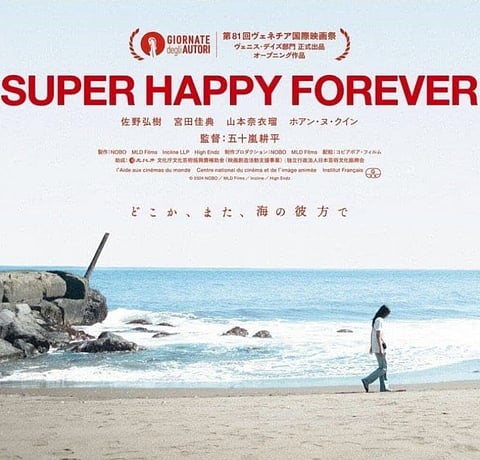“Mono no aware”, or the pathos of things, is a Japanese concept that evokes a poignant awareness of life라이브 바카라 impermanence and the beauty found in fleeting moments. It -permeates the essence of Super Happy Forever (2024) —a film that explores how love, time, and people slip away no matter how tightly we try to hold onto them. Director Kohei Igarashi captures this transience with a quiet, melancholic grace, in a story that unfurls like a tide pulling away from shore—gentle, inevitable, and tinged with longing.
Super Happy Forever Review: Kohei Igarashi's Pensive Take On Love And Impermanence
바카라 at HIFF | Igarashi reflects on how ephemeral objects, memories, and even the people we love can be in this meditative feature.
The film—screened at the 6th edition of the Habitat International Film Festival, New Delhi— fractures time, beginning in the present before rewinding five years into the past. Sano (Hiroki Sano) and his friend Miyata (Yoshinori Miyata) return to the seaside town of Izu. But for Sano, this is not just a visit—it is a ritual of remembrance. He checks into the same hotel, stays in the same room, smokes the same cigarettes, wears the same T-shirt he did five years ago, as if by meticulously retracing his past, he might summon what has already slipped away.
It is quickly made evident that Sano is grieving the death of his wife. When called about a professional commitment she made, he hurls his phone into the ocean, an act of anger and helplessness. Miyata tries to pull him back, offering small gestures to cheer him up, but Sano remains unreceptive. Later, at a karaoke bar, he takes the microphone, swaying in a drunken haze, and begins to sing Bobby Darin라이브 바카라 Beyond the Sea.

"Somewhere, beyond the sea
She's there, watching for me..."
His voice cracks and the words slur, yet they carry the weight of something deeply felt. The song, seemingly incidental at first, later becomes a quiet refrain in the film—one that circles back with heartbreaking resonance.
A red cap, lost years ago, is the anchor for Sano라이브 바카라 grief—small, unremarkable, yet deeply significant. He bought it for his late wife Nagi (Nairu Yamamoto) when they first met. In a faded photograph, she wears it, her face obscured by the camera라이브 바카라 flash, as if time has already begun erasing her. The cap is more than an object; it is the last tangible proof of a love that once felt infinite. Sano searches for it, not because he expects to find a cap lost years ago, but because the search itself gives shape to his grief.

Then, the film shifts. We are pulled five years into the past, when Sano and Nagi first crossed paths. Nagi, a photographer, is constantly losing things—her belongings, her sense of time, perhaps even pieces of herself. "I often wonder what happens to all the things I lose," she muses in passing, a line that only resonates fully in retrospect.
Yamamoto brings an effortless charm to the role, making Nagi라이브 바카라 absence in the first half of the film all the more palpable. Their relationship unfolds in quiet, fleeting moments—shared glances, laughter over late-night noodles, and singing along to Bobby Darin라이브 바카라 "Beyond the Sea." Each of these moments, seemingly ordinary, becomes significant when viewed through the lens of inevitable loss.
Wataru Takahashi라이브 바카라 cinematography captures this feeling in a meditative, almost dreamlike fashion. The seaside town is rendered in soft, muted colors, as though time itself is eroding the frame. Reflections in water, empty spaces, and the slow closing of elevator doors blur the boundaries between past and present, making the film feel like a memory slipping further out of reach.

At first, the film feels elusive, even withholding. The first half leaves us stranded alongside Sano, uncertain of what he grieves and why. It is a bold choice to introduce us to a man unraveling before we fully understand his loss. But as time folds backward, the film reveals itself with quiet precision. The red cap—once a minor detail—becomes the film라이브 바카라 gravitational center, binding past to present, love to loss, memory to oblivion.
Ultimately, Igarashi asks you to consider how ephemeral objects, memories, and even the people we love can be. It challenges the idea that love is defined by permanence, instead revealing it in a song hummed together or a bowl of noodles shared on the side of the road.
Yet, as time erodes these moments, their meaning deepens. Super Happy Forever does not try to fight this impermanence. Instead, it invites us to sit with it, to recognize that the ache of something slipping away is, in its own way, proof that it once mattered.

